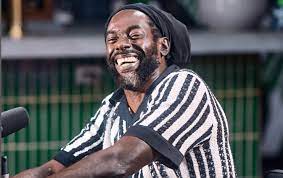
Buju Banton is one of the world’s most renowned reggae artists, who only recently came out of prison. He was sentenced to ten years and one month in a federal prison for a cocaine trafficking conviction and was released on December 7, 2018, from McRae Correctional Institution in Georgia.
Since his release, he returned straight to music, launching “The Long Walk to Freedom” tour, and performed his first concert at the National Stadium in Kingston, Jamaica, in March 2019. The concert attracted over 30,000 people.
In a recent interview with the popular Revolt TV show “Drink Champs,” hosted by NORE and DJ EFN, Buju Banton made some claims that have sparked controversy. Whether driven by vitriol or misinformation, these statements have been widely debated.
Buju Banton criticises Afrobeats for having a lack of substance and says Afrobeat artists don’t aim to free Africa or make an impact pic.twitter.com/ZS8vudz0uR
— TMC Music Connoisseur
WATCH S2TIMES
(@MusicConnoisseu) August 11, 2024
During the interview, Buju made erroneous claims about Afrobeats, suggesting that African artists were connecting with everyone except reggae/Jamaican musicians. This claim is demonstrably false, as many Jamaican reggae artists have collaborated with Afrobeats stars, including Popcaan, Morgan Heritage, Sean Paul, Shaggy, Damian Marley, Busy Signal, Elephant Man, Vybz Kartel, and many more. In fact it is fair to say Jamaica has been one of the most, if not the most prominent collaborator off afrobeats.
Buju also boldly claimed that “Afrobeats is not freeing Africa, it’s fuckery!” Such a statement suggests either a lack of understanding of Afrobeats or a negative bias against the genre’s success. As J. Cole once said, “Idols become rivals.”
One of the most prominent founding figures of Afrobeats was Fela Kuti, whose music originated in the struggle against oppression. Modern Afrobeats began to gain commercial traction in the early 2000s, achieving extraordinary success in the 2020s.
Starting with that period Africans were laced with great pro African music such as J Martins ft P. Square & Timaya – Good Or Bad, 2baba – African Queen & See Me So, Timaya – Dem Mama, Duncan Mighty – Owhornu Ogwu, Asa – Jailer and much much more.
Although today’s Afrobeats scene is often dominated by commercial dance and love songs on the mainstream platforms, the spirit of Africa still thrives in the genre. Artists like Stonebwoy, Yemi Alade, and Burna Boy and more continue to create conscious music that speaks to Africa’s soul.
Yemi Alade’s latest album, “Rebel Queen,” is a testament to this, featuring a swirl of musical styles and languages from across the African continent. She sings in Yoruba, English, Igbo, French, and Swahili, expressing strong, progressive Afro-pride music.
Like every other genre, Afrobeats is broad and diverse, with both authentic artists and those focused on commercial success. What you hear is what you choose, but if you dig deeper, you will find the true spirit of Africa in Afrobeats. So is Buju’s claim a from a stand point of miseducation, or should Africa expect to see a range of raggae artists looking to join the band wagon of detractors of the unstoppable afrobeats movement?
See reactions below…
Buju Banton: Name one Afrobeats song that can uplift us?
Me: Here’s 20 that dropped this year…
1. Burna Boy – Higher
2. Yemi Alade & Ziggy Marley – Peace & Love
3. Wizard Chan – Demons & Angels
4. Show Dem Camp, The Cavemen, Nsikak David & Moelogo – Blessings
5. Ladipoe,… https://t.co/x3IoY2nmKI— gracey mae (@_graceymae) August 11, 2024
Buju is talking nonsense he seems to think the chart topping afrobeats is all thats there. There is a lot of Uplifting African music some of it not in colonisers language hence why he doesn’t know. A lot of the bitterness towards afrobeats is how its successful
—
Bantudroid
(@bantudroid) August 11, 2024
When Sean Paul, Kevin lyttle, and the likes were popping, did they remember Africa? They were all exporting and desperately looking to please the Americas with no single Tour in Africa. Afrobeats build it style and fan base from scratch and y’all crying all of a sudden. Go to bed
— PAID IN FULL (@TheRealHutease) August 11, 2024
Listen to this apala mix, many of the songs on it are between late 1930s to 1960, you will hear dancehall and reggae beat patterns in many of the songs, but not once have this haters always claiming Afrobeats is a rip off Jamaican music given apala credit. https://t.co/jCKVyQXnEl
— Afro Dissect (@Afro_dissect) August 11, 2024
buju banto is a slick hater like ll cool j, it doesn’t sound mad at first but when you deep it it’s just plain hate
— AGOSTINHO™️
(@agostinhozinga) August 11, 2024
Die hard Buju fan here, but I slightly disagree with his assertion. @burnaboy has repeatedly speak and made a number of songs addressing economic, injustice and political corruption. i.e Dangote, Collateral Damage and 20.10.20. Another thing BB should consider is the age of some…
— Drew (@876_originated) August 11, 2024
Message to Buju, Africa will rise, with or without the hatred in your heart.












